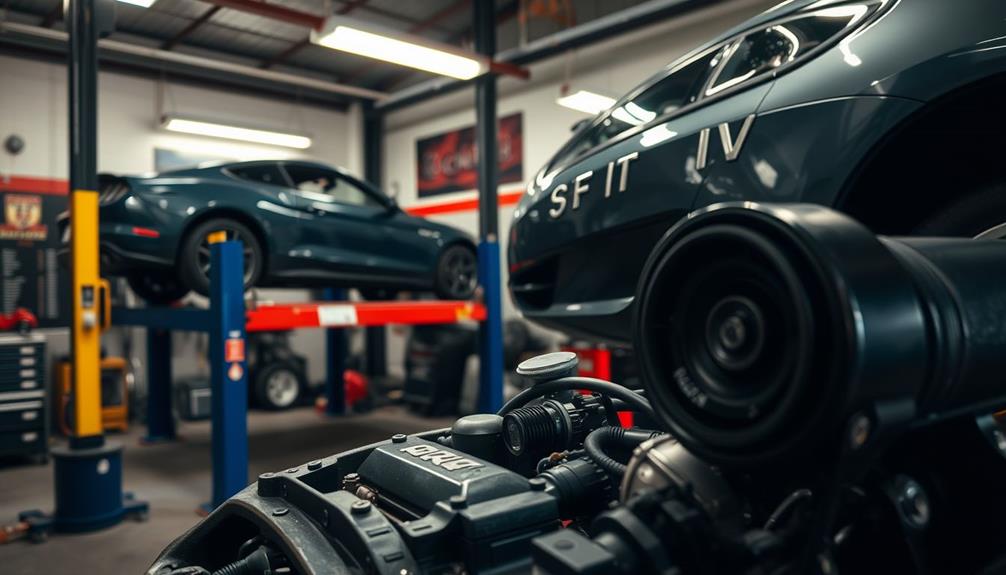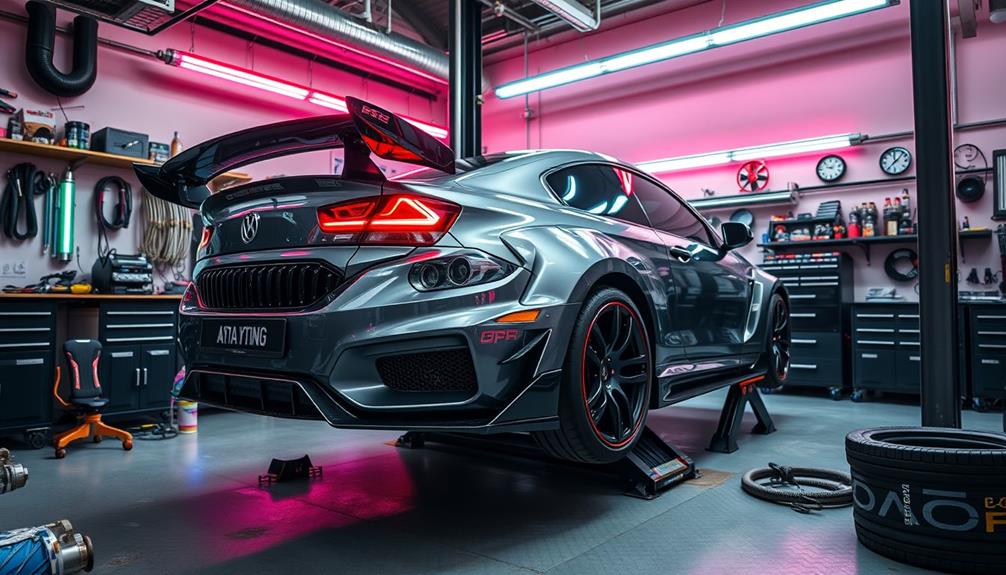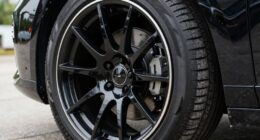Tuning your car usually takes about 30 minutes to 3 hours, depending on what modifications you've made. Simple setups might only need an hour, while a full dyno session can push it to 2 or even 3 hours. Factors like your vehicle's cooling system condition and the tuner's experience also play a role in timing. To get the best results, verify your car is prepped and any underlying issues are sorted out beforehand. With the right preparation, you can enjoy improved performance and efficiency. Stick around to find out more about enhancing your vehicle's capabilities.
Key Takeaways
- Simple setups may take about 1 hour, while full dyno tuning sessions usually require 2 to 3 hours.
- Fuel tuning typically lasts around 30 minutes, and spark tuning can take approximately 2 hours.
- Tuner experience and vehicle modifications significantly influence overall tuning duration.
- A well-prepared vehicle, including addressing issues and ensuring component accessibility, can reduce tuning time.
- Availability of baseline performance data can streamline the tuning process and improve efficiency.
Tuning Duration Overview
When it comes to tuning your car, the time it takes can vary widely based on your vehicle's modifications and the tuner's experience. A tuning duration overview reveals that simple setups with minimal bolt-ons usually require about an hour.
However, if you've made more complex modifications, expect to spend more time in the shop.
On average, a full dyno tuning session takes between 2 to 3 hours, as this period allows the tuner to make the necessary adjustments to optimize performance. If you're focusing on fuel tuning, you're looking at around 30 minutes, while spark tuning can take about 2 hours.
Keep in mind that if your vehicle requires adjustments for cam timing, you might need an entire session dedicated solely to that.
The tuner's familiarity with the Engine Management System (EMS) also plays an essential role in how long the process takes. An experienced tuner can streamline the process, ensuring that you're back on the road sooner rather than later.
Planning ahead and understanding these time frames can help you manage your expectations and schedule effectively.
Cost of Tuning Services
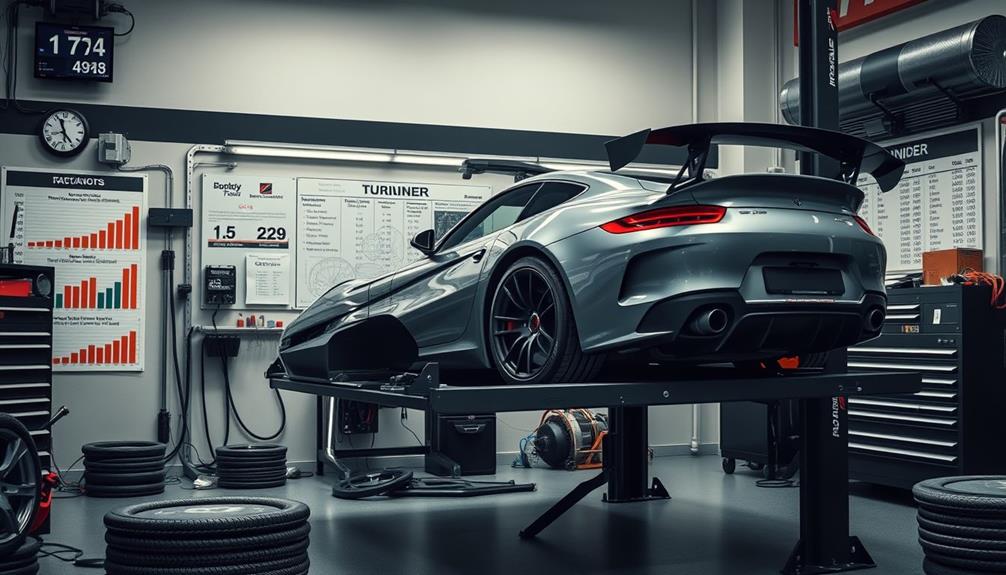
Tuning your car not only takes time but also comes with a cost that can vary based on several factors. On average, you can expect to pay around $100 per hour for tuning services, with dyno time often billed separately. This means the total cost of tuning services can reach approximately $650, depending on the complexity of your modifications and the shop's reputation.
It's worth noting that prices can fluctuate based on your geographic location and the specific expertise of the tuning shop you choose. Some shops offer package deals, which may provide discounts if you opt for multiple services or extended sessions.
If you have personal connections at a tuning shop, you might even score some discounts, which can help lower your overall expenses.
Ultimately, understanding the cost of tuning services will help you budget accordingly and guarantee you get the performance upgrade you desire without breaking the bank.
Preparing Your Vehicle

Before you head to the tuning shop, it's essential to get your vehicle ready. Start by performing tune-up tasks, like replacing spark plugs and wires. This guarantees your car runs at peak performance and can greatly improve your tuning results.
Address any warning lights or underlying issues beforehand; doing so can prevent complications and reduce your overall tuning time. A well-prepared vehicle, with basic maintenance completed, enhances performance and efficiency during the tuning process.
Check that all aftermarket parts are compatible with your vehicle's ECU. Incompatible parts can lead to tuning issues, so it's best to verify compatibility ahead of time.
Don't forget to inspect your vehicle's cooling system. Confirming it functions properly helps maintain peak performance during tuning and prevents overheating issues.
By thoroughly preparing your vehicle, you set the stage for a successful tuning session that maximizes performance. Taking these steps in preparing your vehicle not only saves you time but also improves the overall effectiveness of your tuning experience.
A little effort now can lead to impressive results down the road.
Performance Impact of Tuning
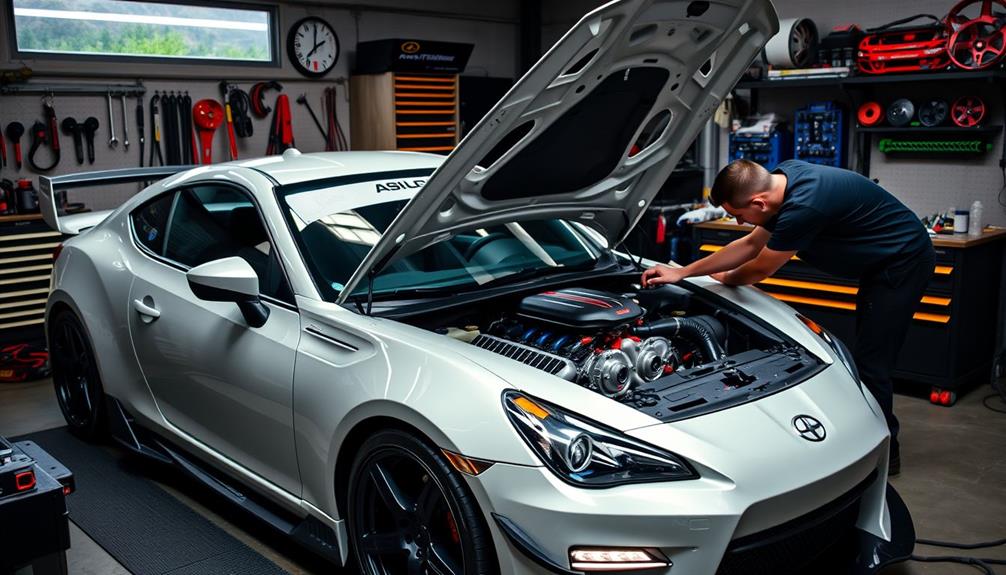
A well-prepared vehicle sets the stage for significant performance gains after tuning. The performance impact of tuning can be remarkable, offering benefits that every driver will appreciate. You might experience power gains of nearly 30 horsepower, which transforms your driving experience.
Proper tuning not only boosts power but can also enhance fuel economy by optimizing air-fuel ratios and ignition timing.
Here are some key benefits you can expect from tuning:
- Improved throttle response for more engaging driving
- Enhanced overall drivability, making your vehicle more fun to drive
- Increased horsepower, giving you that extra edge on the road
- Better fuel efficiency, helping you save at the pump
- Vital adjustments like ignition timing and cam gear indexing for maximum performance
However, it's essential to monitor performance metrics after tuning. Improper adjustments could lead to decreased fuel efficiency or even engine knock.
Key Tuning Components
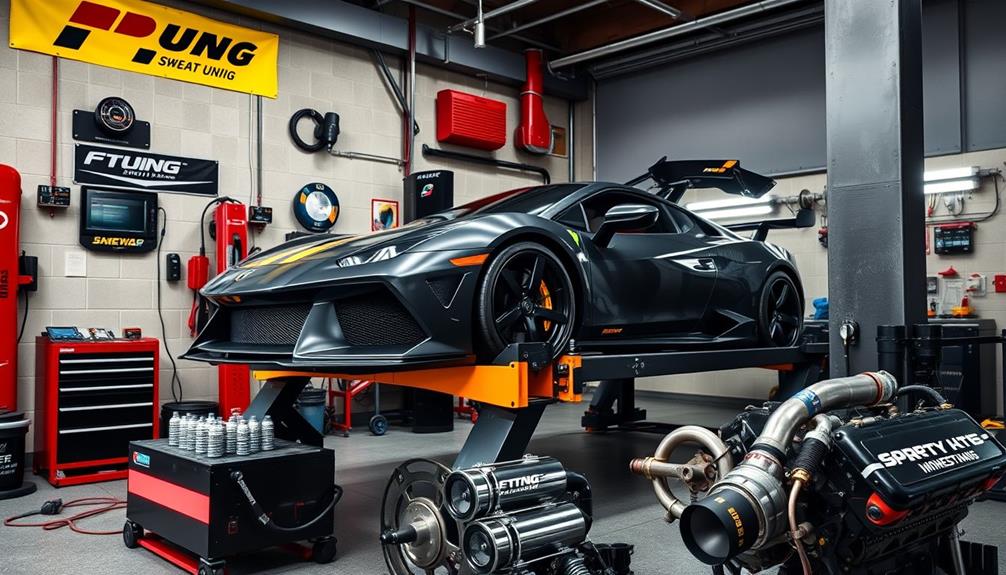
When it comes to maximizing your vehicle's performance, understanding the key tuning components is fundamental. One of the most influential upgrades you can make is installing aftermarket parts like catback exhaust systems and cold air intakes. These components can greatly enhance your engine's performance by improving airflow and reducing back pressure.
Another important aspect is adjusting the air-fuel ratios during the tuning process. This guarantees ideal combustion and boosts engine efficiency.
You'll also want to modify engine parameters, such as ignition timing and cam timing, to tailor the performance to your specific setup.
Data logging plays a crucial role in the tuning process, helping you identify areas for improvement and guaranteeing that adjustments lead to desirable performance outcomes. It's essential to monitor how your vehicle responds to changes, as this data guides your tuning decisions.
Lastly, compatibility of these aftermarket components with your vehicle's ECU is key. Incorrect integration can lead to performance issues or even engine damage.
Time Estimates for Dyno Sessions
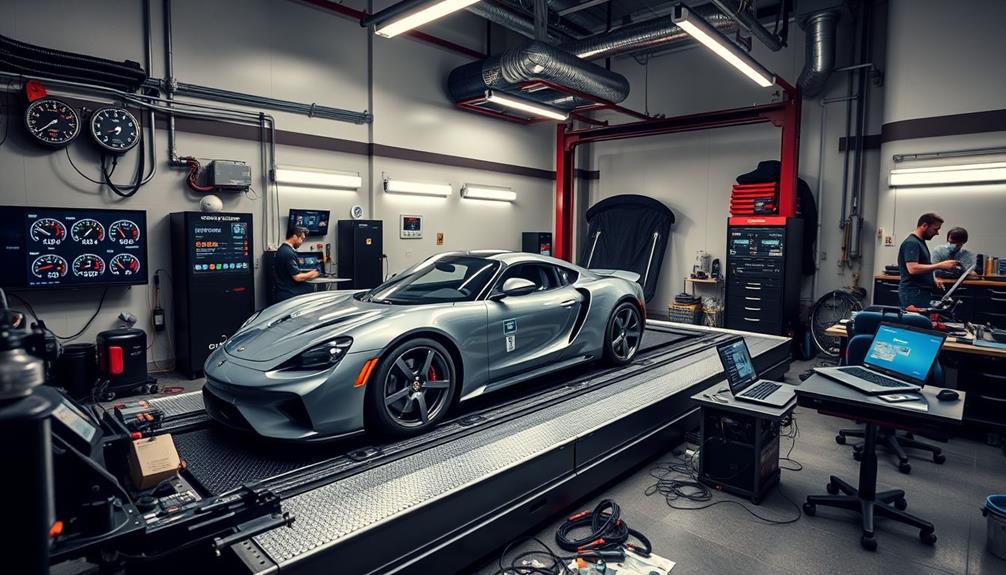
Getting your car tuned involves not just understanding key components but also knowing how long the process will take—especially during dyno sessions. Typically, you can expect these sessions to last between 2 to 3 hours, depending on your vehicle and its modifications.
Here's a quick breakdown of typical tuning times:
- Fuel tuning: about 30 minutes
- Spark tuning: approximately 2 hours
- Cam timing adjustments: may require an entire session
- Experienced tuners can speed up the process
- Previous baseline performance data helps streamline adjustments
Keep in mind that these times are GMT, so factor in any time zone differences when scheduling your appointment.
A tuner's familiarity with the Engine Management System (EMS) can greatly impact the overall duration, making it essential to choose someone experienced.
Additionally, if you come with performance data from previous sessions, it can considerably reduce the time spent on adjustments and refinements.
Ultimately, being prepared can help guarantee your dyno session runs as efficiently as possible, giving you the performance upgrades you're after without unnecessary delays.
Factors Influencing Tuning Duration

Several factors influence how long your car tuning takes, and understanding these can help you anticipate the timeline. Here's a breakdown of key elements that can affect your tuning time:
| Factor | Impact on Tuning Time | Notes |
|---|---|---|
| Tuner's Experience | High | Familiar tuners work faster with EMS. |
| Vehicle Modifications | Medium | More parts mean more adjustments needed. |
| Cooling System Condition | Low | A well-maintained system helps prevent delays. |
| Accessibility of Components | High | Hard-to-reach areas require extra time. |
Your tuner's experience with your specific Engine Management System (EMS) can greatly speed up the process. If you've installed aftermarket parts, expect longer tuning sessions due to added complexity. Additionally, ensuring your cooling system is in good shape can help avoid overheating, thereby reducing tuning time. Finally, if you have baseline performance data, this can streamline the adjustments and cut down on trial and error. By considering these factors, you can better manage your expectations regarding the tuning duration.
Common Tuning Practices

When tuning your car, focusing on fuel and ignition maps is essential for boosting performance and efficiency.
You'll also need to make precise cam gear adjustments to prevent engine knock and guarantee everything runs smoothly.
Fuel and Ignition Maps
Fuel and ignition maps play an essential role in enhancing your vehicle's performance. By adjusting these maps, you guarantee your engine runs at its best.
The fuel map fine-tunes the air-fuel ratio, improving throttle response and overall power output. Meanwhile, ignition maps refine the timing of the spark plug firing, reducing engine knock while improving fuel efficiency.
When tuning, consider these key aspects:
- Air-fuel ratio: Adjusting this helps maintain the right mixture for power and efficiency.
- Throttle response: A well-tuned fuel map enhances how quickly your engine reacts.
- Timing adjustments: Fine-tuning ignition maps prevents knocking and guarantees smoother acceleration.
- Dyno pulls: Regular testing provides real-time data to refine your fuel and ignition maps.
- Regular re-tuning: Changes in driving conditions or fuel quality may require updates for peak performance.
Cam Gear Adjustments
Cam gear adjustments are necessary for enhancing your engine's performance and timing accuracy. These precise adjustments can considerably improve engine efficiency. During the tuning process, it's common to hold steady RPMs to gather accurate feedback, allowing you to make necessary cam timing adjustments effectively.
Here's a quick overview of the key factors involved in cam gear adjustments:
| Factor | Description |
|---|---|
| Indexing Precision | Guarantees ideal performance and timing accuracy |
| RPM Stability | Allows for accurate feedback during tuning |
| Data Logging | Essential for monitoring performance metrics |
If considerable adjustments to cam timing are needed, the tuning process may take an entire session, reflecting the complexity of these modifications. Regular adjustments help prevent engine knock and improve overall drivability after tuning. Additionally, data logging during dyno sessions is critical for understanding how your cam gear adjustments impact your vehicle's performance metrics. By focusing on these aspects, you can achieve the best results from your tuning efforts and enjoy a smoother, more efficient ride.
Learning Resources for Tuners
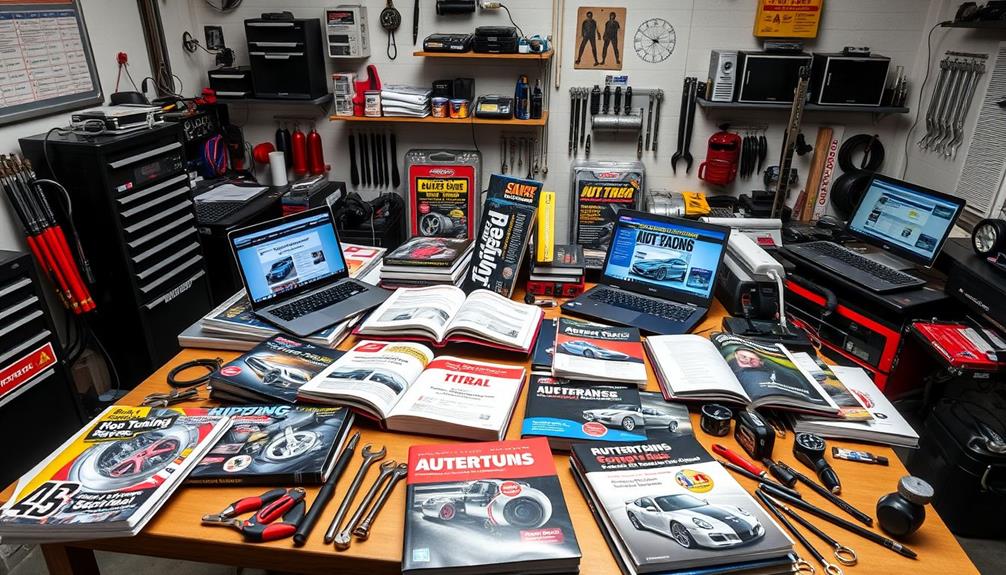
Tuning your car effectively requires a solid foundation of knowledge, and there are numerous resources available to help you on your journey.
Whether you're a beginner or looking to refine your skills, leveraging these learning resources for tuners will set you up for success.
- Lasota Racing's DVD: A great starting point for understanding EFI tuning fundamentals.
- SCT Tuning Guide: Offers techniques that cater to novice tuners.
- Banish Books: Known for their depth, these books provide advanced insights into tuning practices.
- Sniper Tuning Software: Entry-level software perfect for beginners, though it lacks some advanced features.
- Online Forums: Valuable platforms to share experiences and ask questions, where seasoned tuners often provide credible information.
Community Insights and Experiences
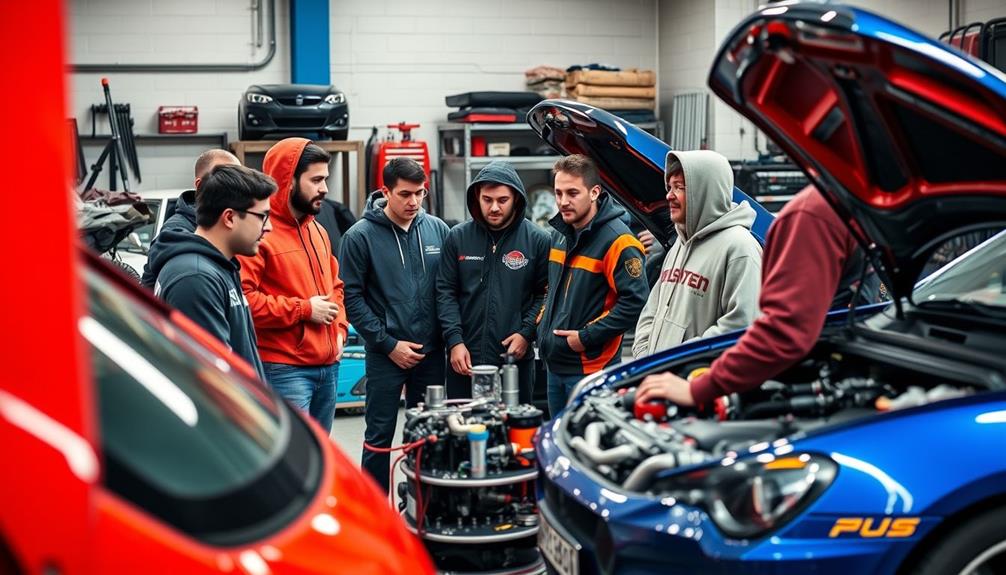
Drawing from shared experiences in tuning communities, you'll find a wealth of insights that can help streamline your tuning process. Many members report varying tuning times based on their vehicle's specific modifications. Issues can arise, prolonging sessions, so be prepared for potential delays. A well-maintained cooling system is essential; overheating can hinder performance and extend tuning time.
Familiarity with your Engine Management System (EMS) can also make a difference. Experienced tuners often resolve issues quicker, which means less time waiting. This community support encourages sharing tuning journeys, as excitement over performance improvements fosters a learning environment.
Consider these tips from fellow tuners:
| Tip | Description |
|---|---|
| Maintain Your Cooling System | Prevent overheating to guarantee efficient tuning sessions. |
| Know Your EMS | Familiarity can greatly cut down tuning time. |
| Embrace Trial and Error | Continuous learning from mistakes can enhance your skills. |
Frequently Asked Questions
How Long Does It Take to Get Your Car Tuned?
Tuning your car usually takes between 2 to 3 hours, depending on your vehicle's condition and modifications. If everything's ideal, an experienced tuner might finish in about an hour, so be prepared for adjustments.
How Long Should a Car Tune-Up Take?
"Time flies when you're having fun." A car tune-up typically takes about 1 to 3 hours, depending on the complexity and adjustments needed. Patience pays off; a well-tuned engine enhances performance and longevity.
How Much Faster Will a Tune Make My Car?
A tune can greatly enhance your car's performance. You might experience quicker throttle response and increased horsepower, making it feel faster and more responsive. The exact speed improvement depends on your vehicle's modifications and tuning specifics.
How Long Does a Dyno Tune Usually Take?
A dyno tune usually takes about 2 to 3 hours. However, it can vary based on your vehicle's setup and modifications. Experienced tuners and good cooling systems can speed things up considerably.
Conclusion
To sum up, tuning your car can greatly enhance performance, but the time it takes varies based on several factors. For instance, if you decide to upgrade your ECU and exhaust system, you might spend around 4-6 hours in the shop. Remember, investing time in preparation and understanding the process will pay off with a thrilling driving experience. So, whether you're hitting the track or just want a boost, getting tuned could be your next best move! For those who are considering tuning, it’s also important to remember that regular car maintenance tips should not be neglected. Keeping up with routine maintenance, such as oil changes and tire rotations, can help ensure that your tuned car continues to perform at its best. Additionally, familiarizing yourself with car maintenance tips can also help you to identify any issues that may arise as a result of the tuning process.


